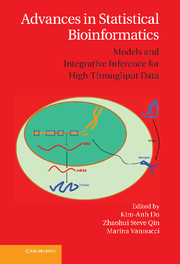Book contents
- Frontmatter
- Contents
- List of Contributors
- Preface
- 1 An Introduction to Next-Generation Biological Platforms
- 2 An Introduction to The Cancer Genome Atlas
- 3 DNA Variant Calling in Targeted Sequencing Data
- 4 Statistical Analysis of Mapped Reads from mRNA-Seq Data
- 5 Model-Based Methods for Transcript Expression-Level Quantification in RNA-Seq
- 6 Bayesian Model-Based Approaches for Solexa Sequencing Data
- 7 Statistical Aspects of ChIP-Seq Analysis
- 8 Bayesian Modeling of ChIP-Seq Data from Transcription Factor to Nucleosome Positioning
- 9 Multivariate Linear Models for GWAS
- 10 Bayesian Model Averaging for Genetic Association Studies
- 11 Whole-Genome Multi-SNP-Phenotype Association Analysis
- 12 Methods for the Analysis of Copy Number Data in Cancer Research
- 13 Bayesian Models for Integrative Genomics
- 14 Bayesian Graphical Models for Integrating Multiplatform Genomics Data
- 15 Genetical Genomics Data: Some Statistical Problems and Solutions
- 16 A Bayesian Framework for Integrating Copy Number and Gene Expression Data
- 17 Application of Bayesian Sparse Factor Analysis Models in Bioinformatics
- 18 Predicting Cancer Subtypes Using Survival-Supervised Latent Dirichlet Allocation Models
- 19 Regularization Techniques for Highly Correlated Gene Expression Data with Unknown Group Structure
- 20 Optimized Cross-Study Analysis of Microarray-Based Predictors
- 21 Functional Enrichment Testing: A Survey of Statistical Methods
- 22 Discover Trend and Progression Underlying High-Dimensional Data
- 23 Bayesian Phylogenetics Adapts to Comprehensive Infectious Disease Sequence Data
- Index
- Plate section
15 - Genetical Genomics Data: Some Statistical Problems and Solutions
Published online by Cambridge University Press: 05 June 2013
- Frontmatter
- Contents
- List of Contributors
- Preface
- 1 An Introduction to Next-Generation Biological Platforms
- 2 An Introduction to The Cancer Genome Atlas
- 3 DNA Variant Calling in Targeted Sequencing Data
- 4 Statistical Analysis of Mapped Reads from mRNA-Seq Data
- 5 Model-Based Methods for Transcript Expression-Level Quantification in RNA-Seq
- 6 Bayesian Model-Based Approaches for Solexa Sequencing Data
- 7 Statistical Aspects of ChIP-Seq Analysis
- 8 Bayesian Modeling of ChIP-Seq Data from Transcription Factor to Nucleosome Positioning
- 9 Multivariate Linear Models for GWAS
- 10 Bayesian Model Averaging for Genetic Association Studies
- 11 Whole-Genome Multi-SNP-Phenotype Association Analysis
- 12 Methods for the Analysis of Copy Number Data in Cancer Research
- 13 Bayesian Models for Integrative Genomics
- 14 Bayesian Graphical Models for Integrating Multiplatform Genomics Data
- 15 Genetical Genomics Data: Some Statistical Problems and Solutions
- 16 A Bayesian Framework for Integrating Copy Number and Gene Expression Data
- 17 Application of Bayesian Sparse Factor Analysis Models in Bioinformatics
- 18 Predicting Cancer Subtypes Using Survival-Supervised Latent Dirichlet Allocation Models
- 19 Regularization Techniques for Highly Correlated Gene Expression Data with Unknown Group Structure
- 20 Optimized Cross-Study Analysis of Microarray-Based Predictors
- 21 Functional Enrichment Testing: A Survey of Statistical Methods
- 22 Discover Trend and Progression Underlying High-Dimensional Data
- 23 Bayesian Phylogenetics Adapts to Comprehensive Infectious Disease Sequence Data
- Index
- Plate section
Summary
Introduction and Review of Current Methods
DNA variants have been shown to alter the expression levels and patterns of many human genes in different tissues. Genetic loci responsible for such genetic controls of gene expression are known as expression quantitative trait loci (eQTLs). Such genetical genomics data of genetically diverse individuals provide rich information on gene regulation and links to complex phenotypes. Most commonly used methods for eQTL data analysis focus on identifying genetic variants that affect the mean expression levels of genes. However, effects of genetic variation on gene expression regulation can also be at the co-expression level. We first review some standard methods for eQTL data analysis, focusing on methods for identifying cis- and trans-eQTLs.
Expression Quantitative Trait Loci (eQTL)
Technology advances in large-scale genotyping and genome-wide gene expression measurements are increasingly able to investigate the role of genetic and regulatory variation in different biological contexts (Montgomery and Dermitzakis, 2011). Recent research has focused on understanding how DNA sequence variation can explain variation of gene expression in different tissues and different cellular states (Cheung and Spielman, 2002; Brem and Kruglyak, 2005). Genetics of gene expression studies involve identification of genetic loci that are associated with gene expression variations (eQTLs). Such studies have provided important information on the location and impact of regulatory variants, the tissue specificity of regulatory elements, and the contribution of cis- versus trans-acting variation to the expression of any given gene (Gaffney et al., 2012).
- Type
- Chapter
- Information
- Advances in Statistical BioinformaticsModels and Integrative Inference for High-Throughput Data, pp. 312 - 330Publisher: Cambridge University PressPrint publication year: 2013



